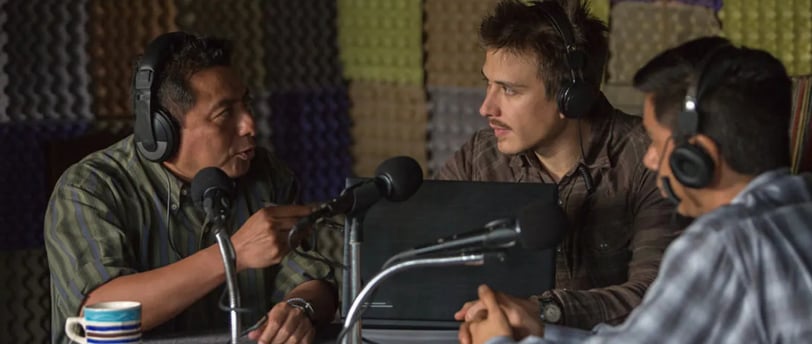Sueño en Otro Idioma
INVOLVED! MOVIELAB’s third appointment
Lorenzo Viterbo
3/6/20253 min read


The third appointment in The House of The Human Safety Net for the “INVOLVED! MOVIELAB” series featured the first screening in Italy of the renowned Mexican film Sueño en otro idioma. This experience brought along the opportunity to engage directly in a brief discussion with the scriptwriter Carlos Contreras once the projection was over.
After a brief debate on the previous screening event, the projection began dragging the audience into the mesmerizing rainforest of Veracruz.
The Plot
The protagonist is Martin, a linguist whose goal is to try to save Zikril, an indigenous language that is facing the risk of disappearance. Further threats to the language are the circumstances that characterise its population. Indeed, the only two speakers in the town, Don Evaristo and Don Isauro, have not been talking for forty years and are unwilling to cooperate due to an unresolved fighting between the two. These, once best friends, dismiss the possibility of engaging in recorded conversations to help the researcher, leaving the latter no choice but to force the collision of the two.
Not only does this dying language revitalize a relationship that was once dead, but it also creates the opportunity for the existence of another one, between Martin and Don Isauro's granddaughter, Lluvia. Both of these connections, characterised by blissful and painful moments, will be central to the question of the Zikril culture, seriously threatened by time and by the ambiguity that is proper to the way in which humans behave.
The beauty of the entire screening lies in the population and its history, fascinatingly entangled with the forest and the animals living within it. Stories and dreamlike sequences foster the idea behind the creation of the language, originated according to a myth as a way to communicate between two lovers, a bird-woman and the first man of the population. Consequently, this way of communicating became the language of all the forest - actively bonding together the land and its people.
This fictitious culture is however put into a context in which there are present issues proper to a system characterized by post colonization and traditional patriarchal values, in which social forces condition some characters to refuse their nature and to act accordingly to the aforementioned norms. Therefore, racial segregation directed at the non spanish speakers is evident, along a heavy catholic influenced way of understanding personal relationship and sexual orientation.
Carlos Contreras, the scriptwriter, after the projection of the film kindly answered all the questions that emerged in the confrontation with the audience, clearing the technical aspects behind the script writing process and the creation of the language, plot doubts, the relation with the director (his brother), and future projects.
Particularly, the creation of the language represented a central topic of discussion. Curated by a professional linguist, it seemed necessary that the fictional words seemed as realistic as possible, grasping the attention of the audience. In this process lies the central convergence of ideas among the professionals involved, and curating such creation the team was able to form a coherent way of expressing in relation with the fictional culture.
Conclusion
This projection posed central plenty of themes that are worth discussing, therefore at the next appointment of the “INVOLVED! MOVIELAB”, on the 26th of March, there will be a brief discussion before such event takes place.
As mentioned before, apartheid and religious influence shape the story heavily. Indeed, Don Isauro was not acquainted with Spanish, and therefore was not able to communicate with most of the people from the town. This situation is critical, since it makes the individual effectively isolated and unable to tell his story, alienating him from society.
At the same time, it is pivotal to get an insight about how the social forces, in this case religion and society itself, effectively contribute to the negation of Don Evaristo’s personality, effectively making him portray himself differently to everyone. This affects the relationship with everyone close to such character, due to the fact that he refuses his way of being and consequently averting the people he really cares about.
To conclude, it is interesting to consider the strength of the Zikril culture, that regardless of the process of slow perishing that is undergoing, still presents a strong identity characterized by rituals, beliefs and aggregation. These heavily communitarian aspects are however contrasted by arrogance and pride of the individuals that create irrational feelings subjecting the collectivity to disappearance.
© 2024. All rights reserved.
Contacts
segreteria@polisvenezia.com
